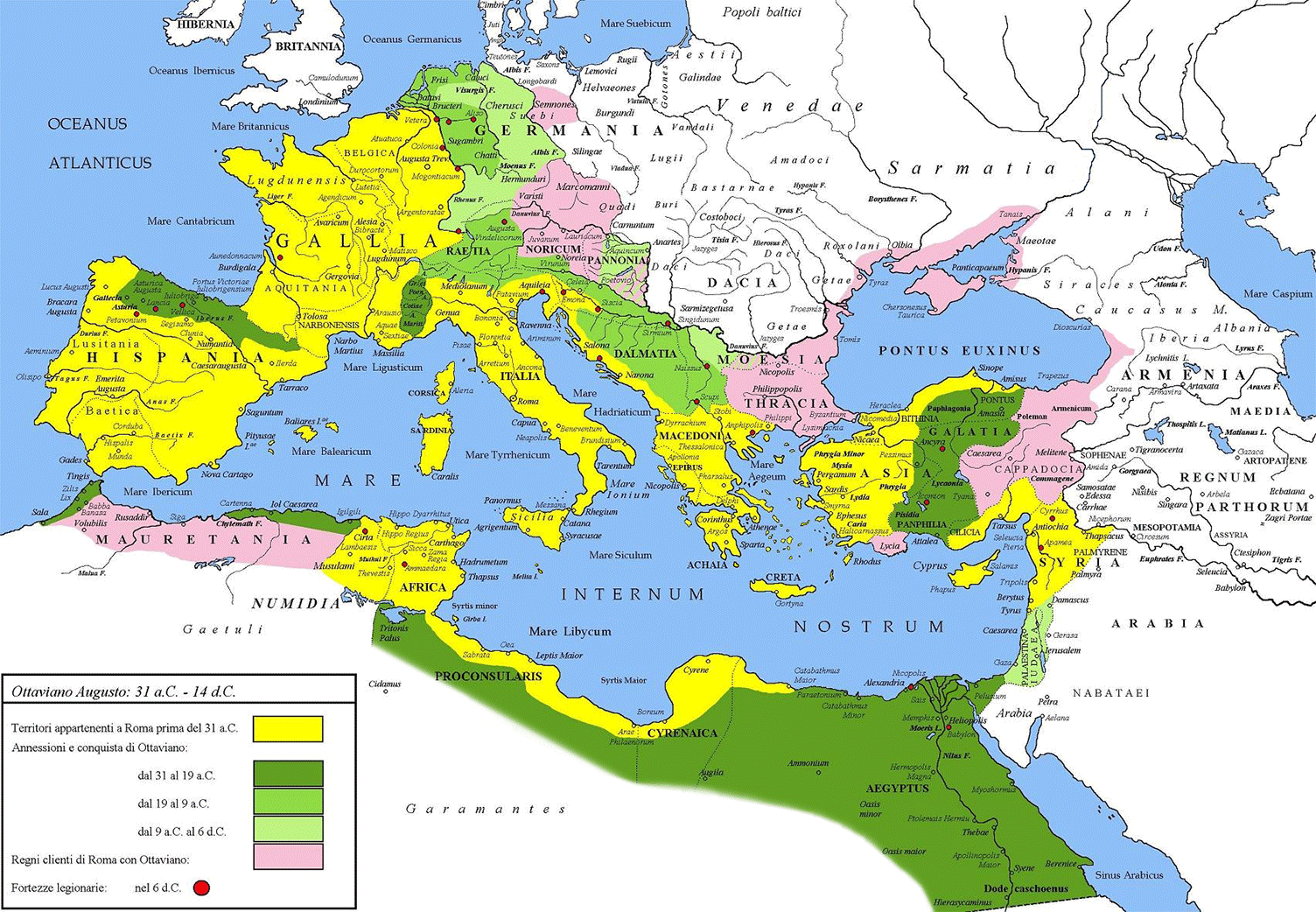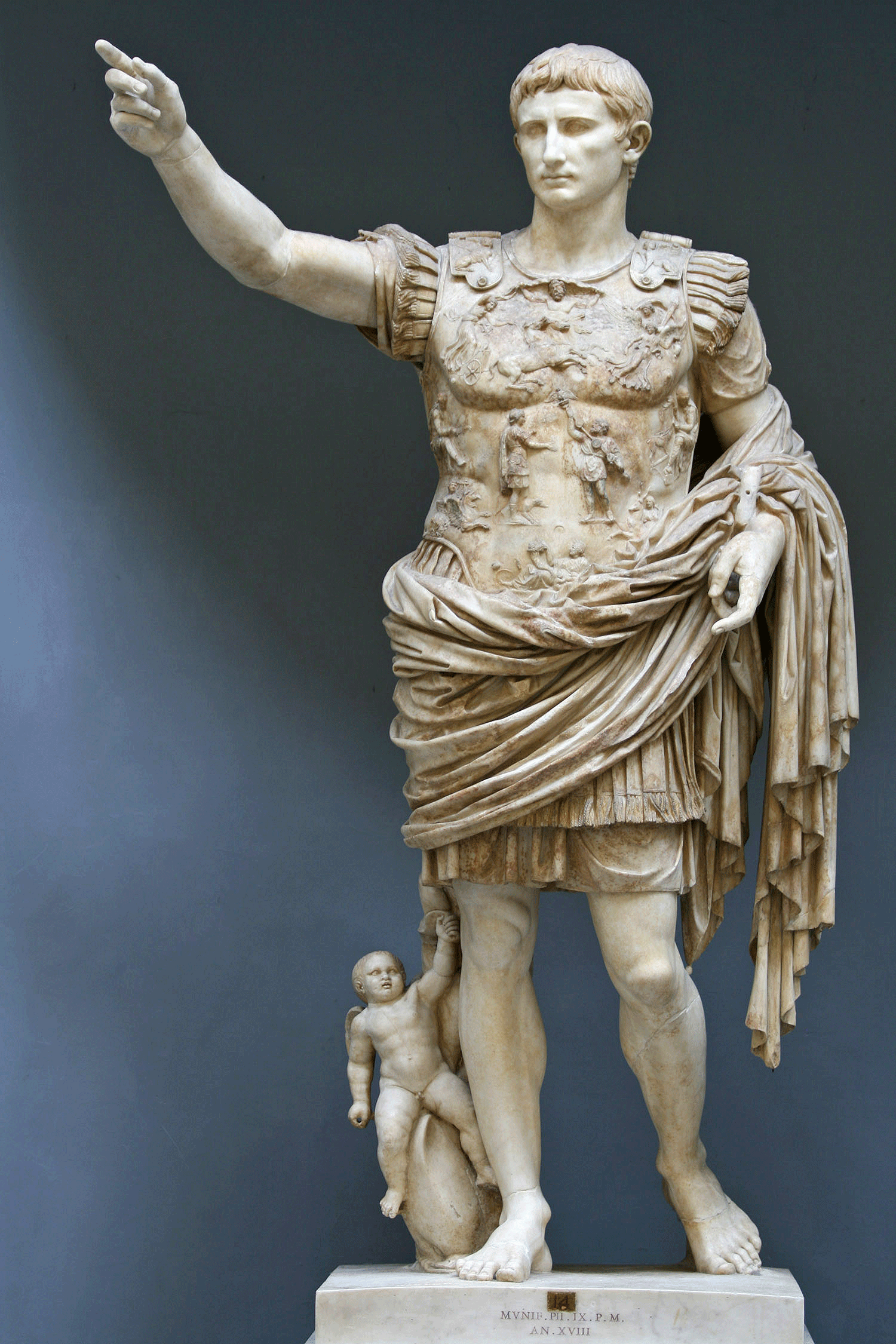CRISTO RAUL.ORG |
 |
READING HALLTHE DOORS OF WISDOM |
 |
 |
AUGUSTUS
THE LIFE AND TIMES OF THE FOUNDER OF THE
ROMAN EMPIRE
(B.C. 63— A.D. 14)
BY
E. S. SHUCKBURGH
CHAPTER I. Childhood and Youth, B.C. 63-44
CHAPTER II. The Roman Empire
at the Death of Julius Caesar
CHAPTER III. The Inheritance
CHAPTER IV. The Consulship
and Triumvirate
CHAPTER V. Philippi
CHAPTER VI. Perusia and Sicily
CHAPTER VII. Actium
CHAPTER VIII. The New Constitution, B.C. 30-23
chapter IX. The First Principatus, B.C. 27-23CHAPTER X. The Imperial and
Military Policy of Augustus
CHAPTER XI. Augustus and his
Worshippers
CHAPTER XII. The Reformer and Legislator
CHAPTER XIII. Later Life and Family Troubles
CHAPTER XIV. The Last Days
CHAPTER XV. The Emperor
Augustus, His Character and Aims, His Work and Friends
AUGUSTUS’S ACCOUNT OF HIS REIGN (FROM THE INSCRIPTION IN THE TEMPLE OF ROME AND AUGUSTUS AT ANGORA)
Preface
Augustus has been much less attractive to biographers
than Julius; perhaps because the soldier is more interesting than the
statesman; “perhaps because the note of genius conspicuous in the Uncle was wanting in the Nephew”. Yet Augustus was the most
successful ruler known to us. He found his world, as it seemed, on the verge of
complete collapse. He evoked order out of chaos; got rid one after the other of
every element of opposition; established what was practically a new form of
government without too violent a breach with the past; breathed fresh meaning
into old names and institutions and could stand forth as a reformer rather than
an innovator, while even those who lost most by the change were soothed into
submission without glaring loss of self-respect. He worked ceaselessly to
maintain the order thus established, and nearly every part of his great empire
had reason to be grateful for increased security, expanding prosperity, and
added amenity of life. Nor can it be said that he leaped the credit due in
truth to ministers. He had excellent minister and agents, with abilities in
this or that direction superior to his own; but none who could take his place as a whole. He was the centre from which their
activities radiated: he was the inspirer, the careful organiser, the unwearied
manipulator of details, to whom all looked, and seldom in vain, for support and
guidance. We may add this to a dignity never forgotten, enhanced by a physical
beauty and grace which helped to secure reverence for his person and office,
and established a sentiment which the unworthiness of some of his successors
could not wholly destroy. He and not Iulius was the founder of the Empire, and
it was to him that succeeding emperors looked back as the origin of their
power.
Yet his achievements have interested men less than the
conquest of Gaul and the victories in the civil war won by the marvellous
rapidity and splendid boldness of Iulius. Consequently, modern estimates of the
character and aims of Augustus have been comparatively few. An exhaustive
treatise is now appearing in Germany by V. Gardthausen,
which will be a most complete storehouse of facts.
Without any pretence to such elaboration of detail, I
have tried in these pages to do something to correct the balance, and to give a
picture of the man as I have formed it in my own mind. The only modest merit
which I would claim for my book is that it is founded on a study as complete as
I could make it of the ancient authorities and sources of information without
conscious imitation of any modern writer. These authorities are better for the
earlier period to about B.C. 24, while they had the Emperor’s own Memoirs on which to rely. The multiform activities of his later life are
chiefly to be gathered from inscriptions and monuments, which record the care
which neglected no part however remote of the Empire. In these later years such
histories as we have are more concerned with wars and
military movements than with administration. Suetonius is full of good things,
but is without chronological or systematic order, and is wanting in the
critical spirit to discriminate between irresponsible rumours and historical
facts. Dio Cassius, plain and honest always, grows
less and less full as the reign goes on. Velleius, who might at least have
given us full details of the later German wars, is seldom definite or precise,
and is tiresome from devotion to a single hero in Tiberius, and by an
irritating style.
It has been my object to illustrate the policy of
Augustus by constant reference to the Court view as represented by the poets.
But in his later years Ovid is a poor substitute for Horace in this paint of
view. The Emperor’s own catalogue of his achievements,
preserved on the walls of the temple at Ancyra, is the best possible summary;
but a summary it is after all, and requires to be made to live by careful study
and comparison.
The constitutional history of the reign is that which
has generally engaged most attention. I have striven to state the facts
clearly. Of their exact significance opinions will differ. I have given my own
for what it is worth and can only say that it has been formed independently by
study of our authorities.
I have not tried to represent my hero as faultless or
to make black white. Nothing can clear Augustus of the
charge of cruelty up to B.C. 31. But in judging him regard must be had to his
age and circumstances. We must not, at any rate, allow our judgment of his
later statesmanship to be controlled by the memory of his conduct in a time of
civil war and confusion. He succeeded in re-constituting a society shaken to
its centre. We must acknowledge that and accept the bad with the good. But it
is false criticism to deny or blink the one from admiration of the other.
|
 |
 |
LIVIA, OCTAVIUS' WIFE
|
TIBERIUS, LIVIA'S SON, OCTAVIUS' SUCCESSOR
|